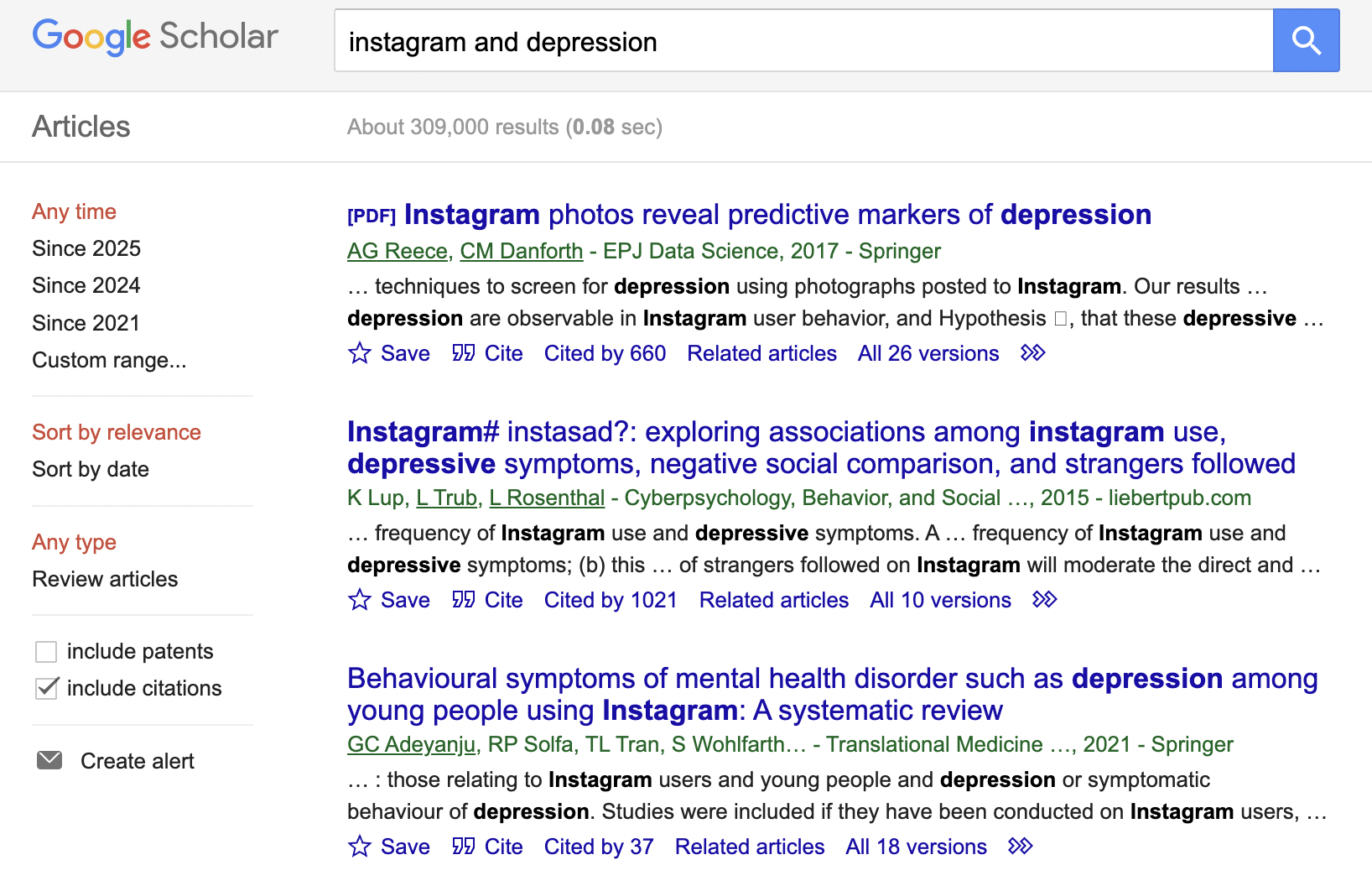42 Choosing relevant scholarly sources
Gina Kessler Lee
Learning Objectives
By the end of this chapter, you should be able to
- Evaluate whether a scholarly article that displays in your search results is relevant to your research question
When you do a search using Google, a library database, or other tools, you’ll often see the terms that match your search terms in bold:
Fig. 42.1. A Google Scholar search for Instagram and depression. [Image Description]
But can you be sure that every source that contains your search terms is relevant to your research question?
Let’s say you’re exploring the question, “Does Instagram cause depression?” All three of the articles in the search results above contain the terms Instagram and depression in the title. But take a closer look at that first source. Is it saying that Instagram causes depression?
A closer look at the first source
EPJ Data Science
2017
Instagram photos reveal predictive markers of depression
Andrew G Reece and Christopher M Danforth
Abstract
Using Instagram data from 166 individuals, we applied machine learning tools to successfully identify markers of depression. Statistical features were computationally extracted from 43,950 participant Instagram photos, using color analysis, metadata components, and algorithmic face detection. Resulting models outperformed general practitioners’ average unassisted diagnostic success rate for depression. These results held even when the analysis was restricted to posts made before depressed individuals were first diagnosed. Human ratings of photo attributes (happy, sad, etc.) were weaker predictors of depression, and were uncorrelated with computationally-generated features. These results suggest new avenues for early screening and detection of mental illness.
Let’s break down this title: “Instagram photos reveal predictive markers of depression.” Does that relate to our research question of whether Instagram causes depression? It seems to be saying that photos on Instagram contain indicators of depression—so, like, maybe we can tell who might have or develop depression based on the images they’re posting on Instagram. But that doesn’t necessarily mean their Instagram use caused the depression.
Let’s look deeper at what the abstract says about what they did: “Using Instagram data from 166 individuals, we applied machine learning tools to successfully identify markers of depression.” Indeed, they’re seeing whether AI can scan someone’s Instagram account and tell from their photos whether they’re depressed, even before they’ve been diagnosed with depression, and no matter whether they look happy or sad in the photo. Still, that’s different from Instagram causing the depression.
For more practice deciphering scholarly articles, look back at the chapter on Rhetorically Analyzing Academic Texts.
Now try it with this example:
Image Descriptions
Fig. 42.1 Image Description. The image is a screenshot of Google Scholar search results for the query “instagram and depression.” At the top is the Google Scholar logo, a search bar with the entered query, and a blue search button. Below, it shows a list of articles related to the search query. On the left, there are filter options for time range, sorting preferences, and type of article. Three articles are displayed in the main section, each with a title, authors’ names, publication details, a brief snippet of content, and options to save, cite, view citations, related articles, and versions. Keywords like “Instagram” and “depression” are highlighted in bold. Transcribed Text: Google Scholar; instagram and depression. Articles: About 309,000 results (0.08 sec); Any time. Sort by relevance. Sort by date. Any type: Review articles, include citations. 1. [PDF] Instagram photos reveal predictive markers of depression AG Reece, CM Danforth – EPJ Data Science, 2017 – Springer … techniques to screen for depression using photographs posted to Instagram. Our results … depression are observable in Instagram user behavior, and Hypothesis, that these depressive …2. Instagram# instasad?: exploring associations among instagram use, depressive symptoms, negative social comparison, and strangers followed K Lup, L Trub, L Rosenthal – Cyberpsychology, Behavior, and Social …, 2015 – liebertpub.com … frequency of Instagram use and depressive symptoms. A … frequency of Instagram use and depressive symptoms; (b) this … of strangers followed on Instagram will moderate the direct and …3. Behavioural symptoms of mental health disorder such as depression among young people using Instagram: A systematic review GC Adeyanju, RP Solfa, TL Tran, S Wohlfarth… – Translational Medicine …, 2021 – Springer … : those relating to Instagram users and young people and depression or symptomatic behaviour of depression. Studies were included if they have been conducted on Instagram users, …[Return to Fig. 42.1]
Media Attributions
- Screen Shot Google Scholar Instagram Depression © Gina Kessler Lee is licensed under a CC0 (Creative Commons Zero) license

